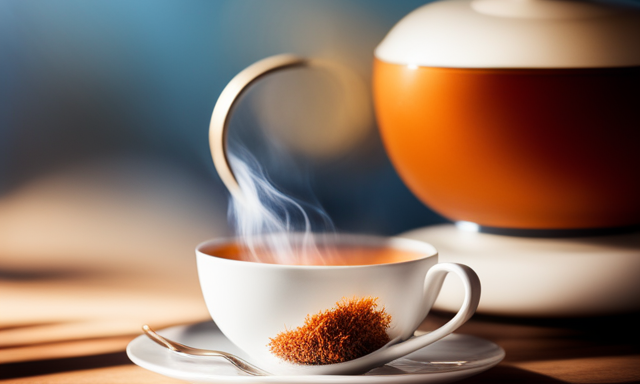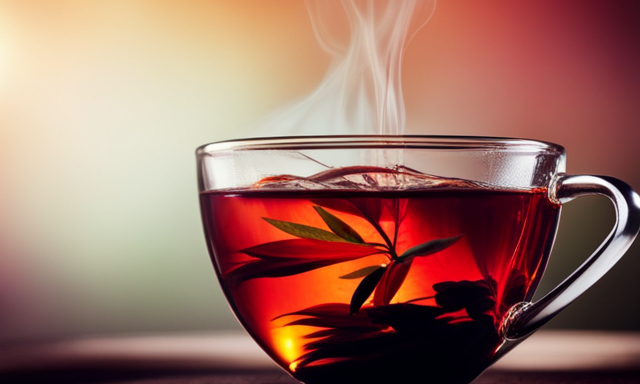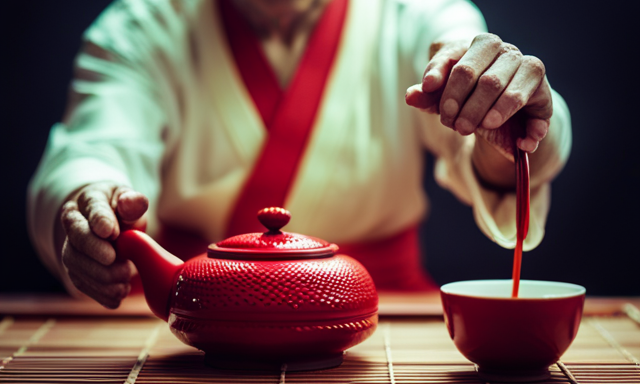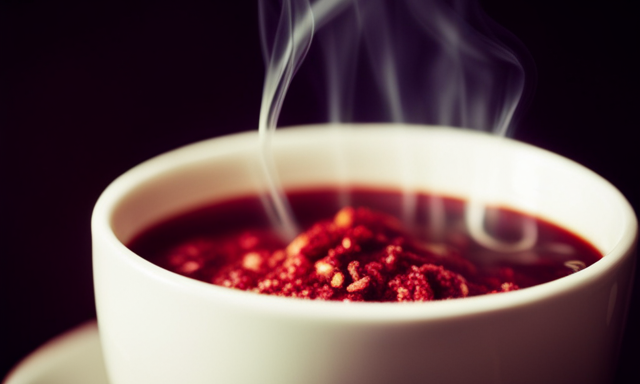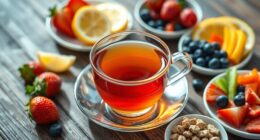As a tea enthusiast and avid tea drinker, I am thrilled to introduce you to the wonders of rooibos tea.
This exquisite beverage, often referred to as ‘red bush tea,’ originates from the rugged mountains of South Africa. The process of making rooibos tea involves harvesting the leaves, allowing them to ferment, and then drying them to perfection. The resulting brew boasts a distinct reddish hue and a delightful earthy flavor.
Rooibos tea offers a myriad of health benefits, from its rich antioxidants to its soothing properties. Whether you’re looking to relax after a long day or boost your immune system, this tea has got you covered.
But rooibos tea isn’t just about the taste and health benefits; it also embodies sustainability and fair trade practices. The production of rooibos tea supports local communities and ensures the preservation of the environment.
So, join me on this journey as we delve into the fascinating world of rooibos tea. From its diverse varieties to the perfect brewing techniques, we will explore all there is to know about this remarkable beverage.
Get ready to savor the aroma and indulge in the extraordinary flavors of rooibos tea – a true treat for the senses.
Key Takeaways
- Rooibos tea is a herbal tea from South Africa, made from the leaves of the Aspalathus linearis plant.
- It is caffeine-free, naturally gluten-free, and has a unique flavor profile with earthiness and sweetness.
- Rooibos tea offers numerous health benefits, including potential weight management, blood sugar regulation, relaxation, and immune system boosting.
- It can be used in various recipes and cocktails, adding flavor and depth to desserts and beverages.
Origin and History of Rooibos Tea
Rooibos tea, also known as red bush tea, has a fascinating origin and history. As a tea expert, I’m excited to share the extensive knowledge I have about this unique beverage.
Rooibos tea comes from the leaves of the Aspalathus linearis plant, which is native to the Cederberg region of South Africa. The tea has been consumed for centuries by the indigenous people of the area, who recognized its numerous health benefits.
Today, rooibos tea farming is a thriving industry in South Africa, with farmers carefully cultivating the plants and harvesting the leaves by hand. The leaves are then dried and undergo a fermentation process, which gives them their distinct reddish color and enhances their flavor.
The resulting tea has a smooth and sweet taste, with hints of vanilla and honey.
Now, let’s delve into the process of making rooibos tea.
The Process of Making Rooibos Tea
Indulge in the rich and soothing experience of crafting this vibrant infusion, as you immerse yourself in the art of transforming nature’s bounty into a comforting elixir. The process of making Rooibos tea is a meticulous one, ensuring that the delicate flavors and aromas are preserved. The leaves of the Rooibos plant, Aspalathus linearis, are harvested and then bruised to initiate the oxidation process. This oxidation gives Rooibos tea its distinct reddish-brown color and enhances its flavor. After oxidation, the leaves are carefully dried, either in the sun or using specialized machinery, before being packaged and ready for brewing. The benefits and uses of Rooibos tea are numerous, ranging from its high levels of antioxidants to its ability to promote relaxation and improve digestion. This versatile tea can be enjoyed hot or cold, with or without milk and sweeteners. Transitioning into the next section, let’s explore the captivating flavor profile and varieties of Rooibos tea.
Flavor Profile and Varieties of Rooibos Tea
Immerse yourself in the captivating flavor profile and explore the wide range of varieties that can be found in this vibrant and comforting elixir. Rooibos tea is renowned for its unique flavors that are both soothing and invigorating. With its rich, earthy taste and subtle hints of sweetness, it offers a delightful sensory experience.
The flavors of rooibos tea can vary depending on the specific variety and how it’s processed. From the robust and full-bodied taste of traditional rooibos to the floral and fruity notes found in flavored blends, there’s a flavor to suit every palate.
Brewing techniques also play a crucial role in bringing out the best flavors in rooibos tea. Whether you prefer a longer steeping time for a stronger infusion or a shorter steeping time for a lighter and more delicate flavor, the brewing process allows you to customize your tea to your liking.
Discover the myriad of rooibos tea flavors and experiment with different brewing techniques to unlock the full potential of this remarkable beverage.
Now, let’s delve into the health benefits of rooibos tea.
Health Benefits of Rooibos Tea
As a tea expert, I’m excited to delve into the health benefits of Rooibos tea. One of the key points to discuss is its antioxidant properties, which help fight against free radicals and promote overall well-being.
Additionally, Rooibos tea is known for its positive effects on digestive health, soothing the stomach and easing discomfort.
Another benefit is its ability to improve skin health, as it contains minerals and antioxidants that promote a clear and radiant complexion.
Lastly, Rooibos tea has been found to provide relief for allergies, helping to reduce inflammation and alleviate symptoms.
With all these benefits, it’s no wonder why Rooibos tea is a favorite among health-conscious tea enthusiasts.
Antioxidant Properties
Enhance your understanding of rooibos tea by exploring its antioxidant properties. As a tea expert, I can provide you with specific and in-depth information about this remarkable tea.
Rooibos tea originates from South Africa and is made from the leaves of the Aspalathus linearis plant. Its production process involves fermentation and drying, resulting in a vibrant red color and a sweet, nutty flavor profile.
Rooibos tea is rich in antioxidants, such as aspalathin and nothofagin, which play a crucial role in preventing chronic diseases. These antioxidants help to neutralize harmful free radicals in the body, protecting cells from damage and reducing the risk of conditions such as heart disease and cancer.
To fully enjoy the antioxidant benefits of rooibos tea, steep it in freshly boiled water for 5-7 minutes.
Now, let’s delve into its impact on digestive health.
Digestive Health
Boost your digestive health with the remarkable benefits of rooibos tea. This South African herbal tea is not only delicious but also known for its positive effects on digestion. Rooibos tea aids in soothing the digestive system, reducing inflammation, and relieving gastrointestinal discomfort. It is rich in antioxidants that help support a healthy immune system and protect against harmful free radicals.
To give you a better understanding, let’s take a look at the table below:
| Benefit | Description |
|---|---|
| Soothes Digestion | Rooibos tea has anti-inflammatory properties that can help ease gastrointestinal issues. |
| Reduces Inflammation | The tea’s antioxidants can reduce inflammation in the digestive tract, promoting overall digestive health. |
| Relieves Discomfort | Rooibos tea can provide relief from common digestive discomfort such as bloating and cramping. |
| Boosts Immune System | The high levels of antioxidants in rooibos tea can strengthen the immune system, supporting overall health. |
With its numerous benefits, rooibos tea is a great addition to your daily routine. Next, we’ll explore how it can also improve your skin health.
Skin Health
Indulge in the remarkable benefits of this herbal elixir and experience a radiant and glowing complexion. As a tea expert, I’m thrilled to share the precise and detailed information about rooibos tea.
This South African gem is known for its natural remedies and is a must-have in any skin care routine. Rooibos tea is rich in antioxidants that help protect the skin from free radicals and promote a youthful appearance. Its anti-inflammatory properties can soothe skin irritations and reduce redness. The tea’s gentle nature makes it suitable for all skin types, including sensitive skin.
Brewing a cup of rooibos tea not only provides a moment of relaxation but also contributes to a healthy and vibrant complexion.
Transitioning into the next section about allergy relief, I’m excited to share more about the incredible benefits of this versatile tea.
Allergy Relief
Soothe your allergy symptoms with the remarkable benefits of this versatile herbal elixir and experience relief from seasonal discomfort.
Rooibos tea, also known as red bush tea, is a caffeine-free infusion made from the leaves of the Aspalathus linearis plant native to South Africa. It’s traditionally used for its allergy-relieving properties, thanks to its anti-inflammatory and antihistamine effects.
Rooibos tea contains quercetin, a natural compound that helps stabilize mast cells and prevents the release of histamines, which are responsible for allergic reactions. Additionally, it supports a healthy immune system, strengthening your body’s defenses against allergens.
To brew the perfect cup of rooibos tea, steep one teaspoon of loose tea leaves or one tea bag in boiling water for 5-7 minutes. Add a touch of honey or lemon for extra flavor.
Transitioning to the next section, let’s explore how to enhance your rooibos tea experience with some brewing tips.
How to Brew the Perfect Cup of Rooibos Tea
Embrace the art of brewing the perfect cup of rooibos tea by allowing the flavors to dance and mingle in your teapot, creating a symphony of warmth and satisfaction. As a tea expert, I can guide you through the precise techniques to brew a delightful cup of rooibos tea.
- Start by selecting high-quality loose leaf rooibos tea, preferably from South Africa, the birthplace of this herbal tea.
- Use freshly boiled water at a temperature of 203°F (95°C) to extract the full flavors of the tea leaves.
- Steep the tea for 5-7 minutes to achieve a rich and robust infusion.
Rooibos tea offers a unique flavor profile, with notes of earthiness and sweetness. Its deep red color and inviting aroma create an enticing experience for the senses.
Now that you know how to brew the perfect cup, let’s explore the world of rooibos tea recipes and uses.
Rooibos Tea Recipes and Uses
Explore the versatile world of rooibos by incorporating it into a variety of recipes and discovering its many uses. As a tea expert, I can tell you that rooibos tea isn’t just delicious on its own, but it also adds a unique flavor and depth to desserts and cocktails.
Rooibos tea infused desserts, such as rooibos tea cake or rooibos tea ice cream, are a delightful way to enjoy the rich and earthy notes of this South African tea. For those looking for a refreshing and flavorful beverage, rooibos tea cocktails, like a rooibos tea mojito or rooibos tea sangria, are a perfect choice.
These creative uses of rooibos tea showcase its versatility and allow you to experience its distinct flavor in new and exciting ways. Now, let’s explore the connection between rooibos tea and weight loss.
Rooibos Tea and Weight Loss
Indulge in the rich, earthy flavors of this South African beverage and discover how it can aid in your weight loss journey. Rooibos tea has been found to have potential benefits for weight management. Studies suggest that it may help boost metabolism and increase fat burning. Additionally, rooibos tea has been shown to regulate blood sugar levels, which can help control cravings and prevent overeating.
Its natural sweetness makes it a satisfying alternative to sugary beverages. To maximize its weight loss benefits, it’s recommended to drink rooibos tea before meals or as a replacement for high-calorie drinks. Incorporating rooibos tea into your daily routine can contribute to a healthier lifestyle.
Transitioning into the subsequent section about sustainability and fair trade practices in rooibos tea production, it’s important to consider the ethical and environmental aspects of its cultivation and harvesting.
Sustainability and Fair Trade Practices in Rooibos Tea Production
As we continue our exploration of rooibos tea, it’s important to delve into the sustainability and fair trade practices surrounding its production. Rooibos tea is primarily grown in the Cederberg region of South Africa, where sustainable farming methods are emphasized. Farmers employ practices that minimize environmental impact, such as using organic fertilizers and practicing crop rotation.
Furthermore, rooibos tea is often sourced from ethical suppliers who prioritize fair wages and safe working conditions for their workers. By supporting these sustainable and fair trade practices, we can ensure that the production of rooibos tea benefits both the environment and the local communities involved.
When you choose a cup of rooibos tea, you’re not just enjoying its unique flavor; you’re also supporting a responsible and ethical industry.
Now, let’s address some frequently asked questions about rooibos tea.
Frequently Asked Questions about Rooibos Tea
As a tea expert, I can confidently say that rooibos tea is safe for children to consume. It’s naturally caffeine-free and doesn’t contain any harmful substances, making it a healthy and enjoyable choice for kids.
Additionally, rooibos tea can actually help with sleep due to its calming properties. It promotes relaxation and can aid in achieving a restful night’s sleep.
Lastly, for those with gluten sensitivities or celiac disease, rooibos tea is a fantastic option as it’s naturally gluten-free. This means that individuals can enjoy the delicious flavors and health benefits of rooibos tea without worrying about any adverse reactions.
Is Rooibos Tea Safe for Children?
You should definitely consider offering rooibos tea to your children as it’s considered safe and caffeine-free. As a tea expert, I can assure you that rooibos tea is a great option for kids. It’s important, however, to take some safety precautions and be mindful of the recommended dosage.
When it comes to preparing rooibos tea for children, here are a couple of tips:
-
Start with a small amount: Begin by offering your child a small cup of rooibos tea to gauge their response and ensure they tolerate it well.
-
Monitor for any allergic reactions: Keep an eye out for any signs of allergies, such as rashes or difficulty breathing. If any such symptoms occur, discontinue use immediately and consult a healthcare professional.
By following these guidelines, you can introduce your children to the world of rooibos tea safely.
Now, let’s move on to the next topic: can rooibos tea help with sleep?
Can Rooibos Tea Help with Sleep?
If you’re struggling to catch some Z’s, a soothing cup of rooibos tea might just be the natural remedy you need. As a tea expert, let me share with you the relaxing properties of rooibos tea.
This delightful herbal tea, originating from South Africa, is known for its ability to promote relaxation and reduce anxiety. Rooibos tea is caffeine-free, making it the perfect bedtime beverage to help you unwind after a long day. Its unique flavor profile, described as smooth, sweet, and slightly nutty, adds to the overall calming experience.
To fully enjoy the benefits of rooibos tea, steep it for about 5-7 minutes in boiling water. As the warm brew fills your senses, it creates a tranquil atmosphere that aids in sleep.
Now, let’s explore the next topic – is rooibos tea gluten-free?
Is Rooibos Tea Gluten-Free?
As a tea expert, I’m always fascinated by the diverse properties of different teas. In my previous subtopic, I discussed the potential of Rooibos tea to aid with sleep. Now, let’s explore another aspect of this intriguing tea: its gluten-free nature. For individuals with celiac disease or those seeking gluten-free alternatives, Rooibos tea is a fantastic option. With its origin in South Africa, this herbal tea is naturally free from gluten, making it a safe and delicious choice.
To evoke a sense of appreciation for Rooibos tea, let me share a table highlighting its health benefits for celiac disease sufferers:
| Health Benefits of Rooibos Tea for Celiac Disease | |
|---|---|
| Soothes Digestive System | Boosts Immune System |
| Reduces Inflammation | Promotes Healthy Skin |
With these remarkable benefits, Rooibos tea is not only a gluten-free alternative but also a nourishing addition to your daily routine. Now, let’s explore where you can find this exquisite tea.
Where to Buy Rooibos Tea
When looking to purchase rooibos tea, there are many fantastic online retailers that offer a wide variety of options to choose from. Here are three top-notch online retailers where you can find the perfect rooibos tea for your taste:
-
TeaHaus: This online retailer offers a diverse selection of rooibos teas sourced from South Africa, where rooibos is grown. Their collection includes traditional rooibos, as well as flavored varieties like vanilla and citrus.
-
Adagio Teas: Known for their high-quality teas, Adagio Teas offers an impressive range of rooibos blends. Whether you prefer pure rooibos or want to try unique combinations like rooibos chai or rooibos with berries, you’ll find it here.
-
The Tea Spot: This online retailer specializes in organic and fair-trade teas, including a delightful assortment of rooibos options. From classic rooibos to rooibos blends infused with herbs and fruits, they have something for every tea lover.
These online retailers ensure a convenient and reliable way to explore and purchase your favorite rooibos teas. Happy shopping!
Frequently Asked Questions
Is rooibos tea naturally caffeine-free?
Yes, rooibos tea is naturally caffeine-free, making it a great choice for those seeking a caffeine-free alternative. It has numerous benefits, including antioxidant properties and a unique flavor profile. For brewing, steep it in boiling water for 5-7 minutes.
Can rooibos tea be enjoyed both hot and cold?
Yes, rooibos tea can be enjoyed both hot and cold, offering a refreshing beverage option for any season. It has numerous health benefits, including its rich antioxidant content and potential to promote relaxation.
What are the differences between green rooibos and red rooibos?
Green rooibos offers numerous health benefits, such as boosting the immune system and aiding digestion. On the other hand, red rooibos is known for its antioxidant properties and potential anti-inflammatory effects.
Are there any known allergies or side effects associated with drinking rooibos tea?
As a tea expert, I must inform you that there are no known allergies or side effects associated with drinking rooibos tea. It is a safe and delicious beverage that offers numerous health benefits.
Can rooibos tea be blended with other herbs or flavors?
Yes, rooibos tea can be blended with other herbs or flavors to create a variety of unique and delicious blends. This allows for endless blending options and the opportunity to enhance both the taste and health benefits of the tea.
Conclusion
After exploring the fascinating world of rooibos tea, I can confidently say that this unique beverage is truly a gem. Its rich history, diverse flavors, and numerous health benefits make it a must-try for any tea enthusiast.
The process of making rooibos tea is meticulous and precise, resulting in a brew that’s both aromatic and flavorful. Whether you’re seeking a soothing cup to unwind or a tasty treat for your taste buds, rooibos tea has got you covered.
So why not indulge in this delightful drink and discover the wonders of rooibos tea for yourself? Cheers!

